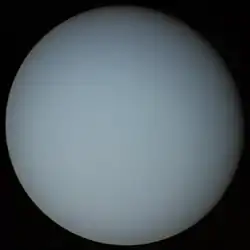天王星
Chinese
| day; sky; heaven | king; Wang (proper name) | star; satellite; small amount | ||
|---|---|---|---|---|
| simp. and trad. (天王星) |
天 | 王 | 星 | |
Pronunciation
Japanese
| Kanji in this term | ||
|---|---|---|
| 天 | 王 | 星 |
| てん Grade: 1 |
おう > のう Grade: 1 |
せい Grade: 2 |
| kan’on | ||

天王星
Etymology
From Literary Chinese 天王 (“heavenly king”) + 星 (“star”), named after Uranus, the personification of the sky in Greco-Roman mythology.
The ō reading for 王 changes to nō as an instance of renjō (連声).
Pronunciation
Proper noun
天王星 (hiragana てんのうせい, rōmaji Tennōsei, historical hiragana てんわうせい)
- Uranus (planet)
- 2009 March 30 [Jan 23 2004], Takeuchi, Naoko, “
Act 29 無 限 3 2人 NEW SOLDIERS [Act 29: Infinity 3: 2 NEW SOLDIERS]”, in美少女戦士 セーラームーン [Pretty Guardian SAILOR MOON], volume 6 (fiction), 6th edition, Tokyo: Kodansha, →ISBN, page 182–183:- そして——風の星天王星を守護にもつ天空の戦士 セーラーウラヌス 参上!
- Soshite ——Kaze no Hoshi Tennōsei o shugo ni motsu tenkū no senshi Sērā Uranusu sanjō!
- And I am ——the warrior of the ether, keeper of Uranus the Wind Planet. Sailor Uranus enters the scene!
- そして——風の星天王星を守護にもつ天空の戦士 セーラーウラヌス 参上!
-
See also
- (planets of the Solar System) 太陽系の惑星 (Taiyōkei no wakusei); 水星 (Suisei, “Mercury”), 金星 (Kinsei, “Venus”), 地球 (Chikyū, “Earth”), 火星 (Kasei, “Mars”), 木星 (Mokusei, “Jupiter”), 土星 (Dosei, “Saturn”), 天王星 (Tennōsei, “Uranus”), 海王星 (Kaiōsei, “Neptune”) (Category: ja:Planets of the Solar System)
- ウーラノス (Ūranosu)
- 冥王星 (Meiōsei)
This article is issued from Wiktionary. The text is licensed under Creative Commons - Attribution - Sharealike. Additional terms may apply for the media files.